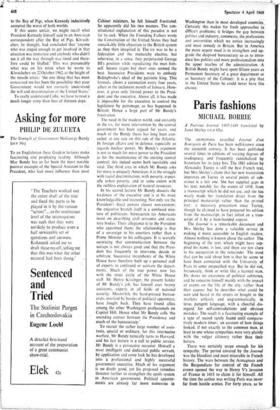Asking for more
PHILIP DE ZULUETA
The Strength of Government McGeorge Bundy (our 36s)
To an Englishman these Godkin lectures make fascinating and perplexing reading. Although Mac Bundy has so far been the most notable postwar example of. the Special Assistant to the President, who had more influence than most
Cabinet ministers, he felt himself frustrated. So apparently did his two masters. The con- stitutional explanation of this paradox is not far to seek. When the Founding Fathers wrote the Constitution of the United States they had remarkably little objection to the British system as they then imagined it. The us was to be a federation and the monarchy elective, but otherwise, in a sense, they perpetuated George Ill's position while repudiating the man him- self. Secure reigns but short ones seemed the best. Successive Presidents were to embody Bolingbroke's ideal of the patriotic king. This formula allows a coronation every four years, albeit in the inclement month of January. How- ever, it gives only limited power to the Presi- dent and the executive. Above all, it has made it impossible for the executive to control the legislature by patronage, as has happened in Britain. Hence a large part of Mr Bundy's frustration.
The need in the modern world, and certainly in the us, for more intervention by the central government has been argued for years, and much of the Bundy thesis has long been con- ceded, at any rate on this side of the Atlantic. In foreign affairs and in defence, especially as regards nuclear power, Mr Bundy's argument is not so much for more power to the President as for the maintenance of the existing central control; this indeed seems both inevitable and vital. The third area in which Mr Bundy asks for more is uniquely American; it is the struggle with racial discrimination, with poverty, especi- ally urban poverty, and to some extent with the ruthless exploitation of natural resources.
In his second lecture Mr Bundy dissects the weakness of the executive and is at his most knowledgeable and interesting. Not only are the President's fiscal powers almost non-existent; the executive branch itself is a confused mix- ture of politicians, bureaucrats (as Americans insist on describing civil servants) and statu- tory bodies. Their allegiance is to the President who appointed them; the relationship is that of a sovereign to his courtiers rather than a Prime Minister to his colleagues. It is scarcely surprising that communication between the satraps is not always good and that the Presi- dent has frequently to intervene, decide or arbitrate. Successive incumbents of the White House have therefore built up a personal staff of experts to confound or activate the depart- ments. Much of the true power now lies with the inner circle of • the White House staff. Mr Henry Kissinger, the present holder of Mr Bundy's job, ' has himself over twenty assistants, experts in all fields of national security. Meanwhile the hard-pressed bureau- crats, overlaid by hordes of political appointees, have fought back. They have found allies among the other Washington professionals on Capitol Hill. Hence what Mr Bundy calls 'the unending contest between the Presidency and much of the bureaucracy.'
To recruit the rather large number of assis- tants, special or ordinary, for this interneoine warfare, Mr Bundy naturally turns to Harvard, and his last lecture is a call to public service. Mr Bundy is a persuasive recruiter. Himself a most intelligent and dedicated public servant, by application and some luck he has developed into a professional and highly successful government executive. Much of his argument is no doubt good, yet his proposed remedies threaten further to strengthen the spoils system in American government. Political appoint- ments are already far more numerous in Washington than in most developed countries. Certainly this makes for fresh approaches to difficult problems; it bridges the gap between politics and industry, commerce, the professions and universities which we notice increasingly and must remedy in Britain. But in America the more urgent need is to strengthen and up- grade the despised bureaucracy so as to intro- duce less politics and more professionalism into the upper reaches of the administration. •A British Bundy might have spent fifteen years as Permanent Secretary of a great department or as Secretary of the Cabinet: it is a pity that in the United States he could never have this chance.


































 Previous page
Previous page